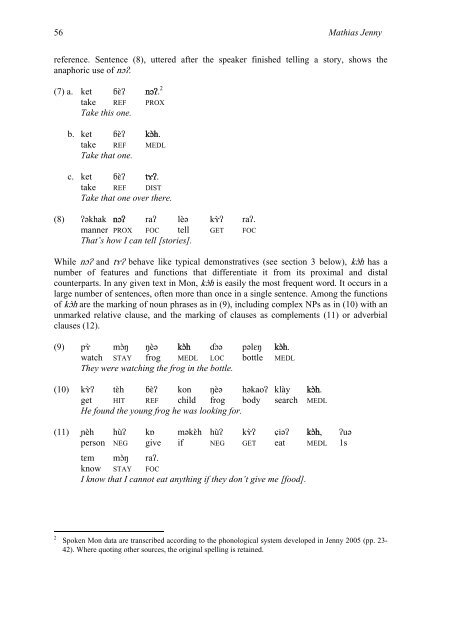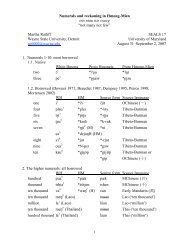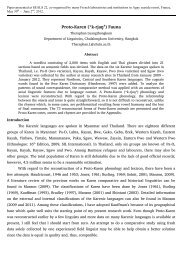- Page 2 and 3:
JSEALS Journal of the Southeast Asi
- Page 4 and 5:
Aspect Marking And Modality In Chil
- Page 7 and 8:
CONTACT-INDUCED CHANGE? REGISTER IN
- Page 9 and 10:
Contact Induced Change? 3 the other
- Page 11 and 12: Contact Induced Change? 5 of Châu
- Page 13 and 14: Contact Induced Change? 7 The origi
- Page 15 and 16: Contact Induced Change? 9 There is
- Page 17 and 18: Contact Induced Change? 11 3. Resul
- Page 19 and 20: Contact Induced Change? 13 Figure 2
- Page 21 and 22: Contact Induced Change? 15 Figure 3
- Page 23 and 24: Contact Induced Change? 17 To sum u
- Page 25 and 26: Contact Induced Change? 19 speakers
- Page 27 and 28: Contact Induced Change? 21 Referenc
- Page 29 and 30: A MINIMALIST APPROACH TO AMIS 1 VOI
- Page 31 and 32: Amis Voice Markers 25 1.2.3 Pearson
- Page 33 and 34: Amis Voice Markers 27 vP Causer/Age
- Page 35 and 36: Amis Voice Markers 29 sounds and me
- Page 37 and 38: Amis Voice Markers 31 (6) a.*patay-
- Page 39 and 40: Amis Voice Markers 33 (12) ma4-pata
- Page 41 and 42: Amis Voice Markers 35 verbs, includ
- Page 43 and 44: IDENTIFYING PREPOSITIONS IN THAI Ki
- Page 45 and 46: Thai Prepositions 39 d. kɨ̀ɨ dâ
- Page 47 and 48: Thai Prepositions 41 Verb: kin ‘t
- Page 49 and 50: Thai Prepositions 43 Verb: sɨ́ɨ
- Page 51 and 52: Thai Prepositions 45 (23) a. raw y
- Page 53 and 54: Thai Prepositions 47 e. kháw maa m
- Page 55 and 56: Thai Prepositions 49 B: yùu / klâ
- Page 57: Thai Prepositions 51 ‘with’, k
- Page 60 and 61: 54 Mathias Jenny (2) Old Mon (Shwei
- Page 64 and 65: 58 Mathias Jenny goḥ, goh, goḥh
- Page 66 and 67: 60 Mathias Jenny Recognitional demo
- Page 68 and 69: 62 Mathias Jenny Table 4: Basic dem
- Page 70 and 71: 64 Mathias Jenny some regularity in
- Page 72 and 73: 66 Mathias Jenny (23) kla tɤʔ si
- Page 74 and 75: 68 Mathias Jenny Unidentifiable: an
- Page 76 and 77: 70 Mathias Jenny Mon, the particle
- Page 79 and 80: TONE NEUTRALIZATION DUE TO CONSONAN
- Page 81 and 82: Mulao Tone Neutralization 75 While
- Page 83 and 84: Mulao Tone Neutralization 77 (7) To
- Page 85 and 86: Mulao Tone Neutralization 79 4.2 Sy
- Page 87 and 88: Mulao Tone Neutralization 81 While
- Page 89 and 90: Mulao Tone Neutralization 83 6 Conc
- Page 91 and 92: EVENTIVITY AND STATIVITY IN THAI VE
- Page 93 and 94: Thai Eventivity & Stativity 87 Pras
- Page 95 and 96: Thai Eventivity & Stativity 89 VERB
- Page 97 and 98: Thai Eventivity & Stativity 91 (doo
- Page 99 and 100: Thai Eventivity & Stativity 93 pred
- Page 101 and 102: Thai Eventivity & Stativity 95 (15)
- Page 103 and 104: Thai Eventivity & Stativity 97 and
- Page 105 and 106: Thai Eventivity & Stativity 99 (20)
- Page 107 and 108: Thai Eventivity & Stativity 101 has
- Page 109 and 110: Thai Eventivity & Stativity 103 Ack
- Page 111 and 112: VIETNAMESE PASSIVE SENTENCES FROM A
- Page 113 and 114:
Vietnamese Passive 107 Lê Xuân Th
- Page 115 and 116:
Vietnamese Passive 109 (especially
- Page 117 and 118:
Vietnamese Passive 111 - The subjec
- Page 119 and 120:
Vietnamese Passive 113 3. Different
- Page 121 and 122:
Vietnamese Passive 115 appear in th
- Page 123 and 124:
Vietnamese Passive 117 Cao Xuân H
- Page 125 and 126:
PROTO-SOUTHWESTERN-TAI REVISED: A N
- Page 127 and 128:
Proto-Southwestern Thai 121 Table 1
- Page 129 and 130:
Proto-Southwestern Thai 123 2.3 Unc
- Page 131 and 132:
Proto-Southwestern Thai 125 2.4 Sif
- Page 133 and 134:
Proto-Southwestern Thai 127 In Lao,
- Page 135 and 136:
Proto-Southwestern Thai 129 outcome
- Page 137 and 138:
Proto-Southwestern Thai 131 Figure
- Page 139 and 140:
Proto-Southwestern Thai 133 Table 1
- Page 141 and 142:
Proto-Southwestern Thai 135 Althoug
- Page 143 and 144:
Proto-Southwestern Thai 137 Appendi
- Page 145 and 146:
Proto-Southwestern Thai 139 Pittaya
- Page 147 and 148:
Proto-Southwestern Thai 141 Referen
- Page 149:
Proto-Southwestern Thai 143 Thisaph
- Page 152 and 153:
146 Amara Prasithrathsint surprised
- Page 154 and 155:
148 Amara Prasithrathsint (17) pho
- Page 156 and 157:
150 Amara Prasithrathsint 2.2.1 Dir
- Page 158 and 159:
152 Amara Prasithrathsint 2.3 Overl
- Page 160 and 161:
154 Amara Prasithrathsint Cinque, G
- Page 162 and 163:
156 Amara Prasithrathsint บํา
- Page 164 and 165:
158 Amara Prasithrathsint ระบ
- Page 166 and 167:
160 Amara Prasithrathsint ตั้
- Page 168 and 169:
162 Sorabud Rungrojsuwan nɔ̌ɔŋ
- Page 170 and 171:
164 Sorabud Rungrojsuwan 3. Methodo
- Page 172 and 173:
166 Sorabud Rungrojsuwan In relatio
- Page 174 and 175:
168 Sorabud Rungrojsuwan Proper nou
- Page 176 and 177:
170 Sorabud Rungrojsuwan in section
- Page 178 and 179:
172 Sorabud Rungrojsuwan expanded a
- Page 180 and 181:
174
- Page 182 and 183:
176 Kiyoko Takahashi 1 Introduction
- Page 184 and 185:
178 Kiyoko Takahashi I would like t
- Page 186 and 187:
180 Kiyoko Takahashi (16) Talmy’s
- Page 188 and 189:
182 Kiyoko Takahashi (21) fəərîi
- Page 190 and 191:
184 Kiyoko Takahashi CAUSE CHANGE S
- Page 192 and 193:
186 Kiyoko Takahashi Table 2: Linea
- Page 194 and 195:
188 Kiyoko Takahashi this syntactic
- Page 196 and 197:
190 Kiyoko Takahashi preposition’
- Page 198 and 199:
192 Kiyoko Takahashi References Bis
- Page 201 and 202:
DATA PAPERS / REPORTS / NOTES A PRE
- Page 203 and 204:
Ende Phonology 197 1993). Nakagawa
- Page 205 and 206:
Ende Phonology 199 velar implosive
- Page 207 and 208:
Ende Phonology 201 / n d/ ~ /d/ nde
- Page 209 and 210:
Ende Phonology 203 /s/ ~ /t/ so'o /
- Page 211 and 212:
Ende Phonology 205 2.1.1.6 Approxim
- Page 213 and 214:
Ende Phonology 207 /�/ ~ /ɾ/ rh
- Page 215 and 216:
Ende Phonology 209 2.1.2.4 The /o/
- Page 217 and 218:
Ende Phonology 211 Table 2.5: Sylla
- Page 219 and 220:
Ende Phonology 213 b. 'embu tegu=ka
- Page 221 and 222:
Ende Phonology 215 2.3.3.3 Lenition
- Page 223 and 224:
Ende Phonology 217 Djawanai, Stepha
- Page 225 and 226:
Ende Phonology 219 Appendix I - End
- Page 227 and 228:
Ende Phonology 221 75 year iwa [ˈi
- Page 229 and 230:
Ende Phonology 223 160 to suck miso
- Page 231 and 232:
Ende Phonology 225 246 to live muri
- Page 233 and 234:
ASPECT MARKING AND MODALITY IN CHIL
- Page 235 and 236:
Child Vietnamese 229 The -i affix i
- Page 237 and 238:
Child Vietnamese 231 1.1 Purpose an
- Page 239 and 240:
Child Vietnamese 233 Table 3: Gener
- Page 241 and 242:
Child Vietnamese 235 utterances con
- Page 243 and 244:
Child Vietnamese 237 Eventivity Con
- Page 245:
Child Vietnamese 239 Table 9: Share
- Page 248 and 249:
242 Songgot Paanchiangwong of inter
- Page 250 and 251:
244 Songgot Paanchiangwong Note, ho
- Page 253:
JSEALS style guide for authors Pape





